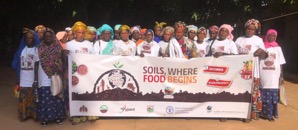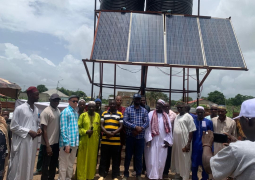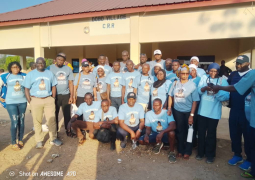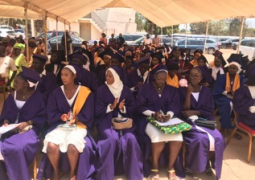
The theme for this year’s commemoration was ‘Soils, where food begins.’ WSD is held annually on the 5th December. It aims to focus attention on the importance of healthy soil and advocates for sustainable soil management.
This year’s commemoration was the 3rd in the series.
Ebrima Jarra, the executive director of The Soil Solution – The Gambia said WSD aims to raise awareness of the importance of maintaining healthy ecosystems and human well-being by addressing key challenges related to soil fertility, soil health and nutrient imbalance.
“WSD celebration in The Gambia is a unique platform that celebrates soils and engage citizens to improve soil health in The Gambia,” he added.
He described soils as most essential for life on earth but was quick to add that it has been threatened by multiple forms of degradation, noting that soil erosion and soil nutrient imbalance have been identified as part of the-top ten threats to soils in NBR causing negative environmental, social and economical effects in the area.
He therefore called on all stakeholders to work with his organisation in protecting the soils to ensure food security in the country, saying 95 percent of human foods come from the soils either directly or indirectly.
Abdou Rahman Jobe, the director of Soil and Water Management Services under the Ministry of Agriculture described soil as an essential resource that produces large quantities of global foods.
He added that soil provides living space for humans as well as essential ecosystem services which are important for water regulation and supply, climate regulation, biodiversity conversation, carbon sequestration and cultural services.
However, he said soils are under pressure from increase in population, high demand for foods and competing land uses.
John Mendy, the Director of Agriculture for North Bank Region said: “About one third of soils worldwide are already degraded, and the loss of soil fertility means that land is less productive and many cereals, vegetable and fruits are not as rich in vitamins and nutrients as they were 70 years ago.” He therefore called for collective soil management to ensure crop productivity.
Sanna Colley, in representing the Regional Governor urged farmers to continue engaging agriculturists to enhance agricultural productivity and food security in the country.
He also advised farmers to use compose fertilizer on their farms to boost productivity.
He further said that there cannot be food security without healthy soil within the environment.
Jonsaba Jawara, a women leader called for attitudinal changes toward the soil to ensure its sustainability, adding that there is a need for all to stop deforestation.
About WSD
The WSD was recommended by the International Union of Soil Sciences (IUSS) in 2012. Under the leadership of the Kingdom of Thailand and within the framework of the Global Soil Partnership, FAO has supported the formal establishment of WSD as a global awareness raising platform.
The FAO Conference unanimously endorsed WSD in June 2013 and requested its official adoption at the 68th UN General Assembly. In December 2013, the UN General Assembly responded by designating 5th December 2014 as the first official WSD.
Read Other Articles In National News

Australian-Funded Borehole ends years of water crisis in Jiboroh Kuta
Sep 9, 2025, 11:51 AM



